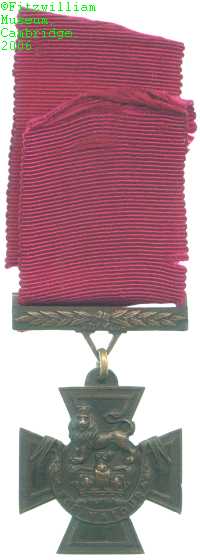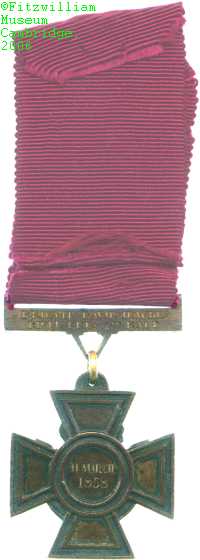
Obverse, a lion standing over a crown with the inscription "For Valour" on a banner below, all on a Maltese cross

Reverse, inscription in a double ring on a Maltese cross

Obverse, a lion standing over a crown with the inscription "For Valour" on a banner below, all on a Maltese cross |

Reverse, inscription in a double ring on a Maltese cross |
The Victoria Cross is the highest award for gallantry that can be made by the United Kingdom. Instituted in 1856 to recognise deeds done in the Crimean War, reportedly at the suggestion of Prince Albert, the new medal was to be given "for valour". Even today this simple statement justifies the medal's award. The first medals were legendarily struck from bronze from the captured Russian guns of Sebastopol, although it is now believed that the metal came from older Chinese cannon that were found in the Arsenal in 1857. (These weapons may however have been captured from the Russians during the Crimean campaign.) The design was entrusted to the London jewellers' firm of C. F. Hancock & Sons, Holborn, and it is there that the Victoria Cross is still made when it is awarded today.
This Cross was awarded to Private David Hawkes, of the 2nd Battalion of the Rifle Brigade (The Prince Consort's Own). David Hawkes (1822-58) was 35 years old during the Indian Mutiny (which is described more fully elsewhere) when the deed took place for which he was awarded the VC. On 11 March 1858 at Lucknow, India (one of the towns which most immediately bore the brunt of the uprising and had to endure a long siege), Private Hawkes's company was engaged with a large number of the enemy near the Iron Bridge. At one stage a captain (Henry Wilmot) found himself at the end of a street with only four of his men, opposed to a considerable body of the enemy. One of the men was shot through both legs and Private Hawkes, although severely wounded, lifted him up with the help of a corporal (William Nash) and they then carried their comrade for a considerable distance, the captain firing with the men's rifles and covering the retreat of the party.
Hawkes's luck did not last; he was killed in action at Fyzabad, India on 14 August 1858. Lester Watson purchased his Cross at some point before 1928.